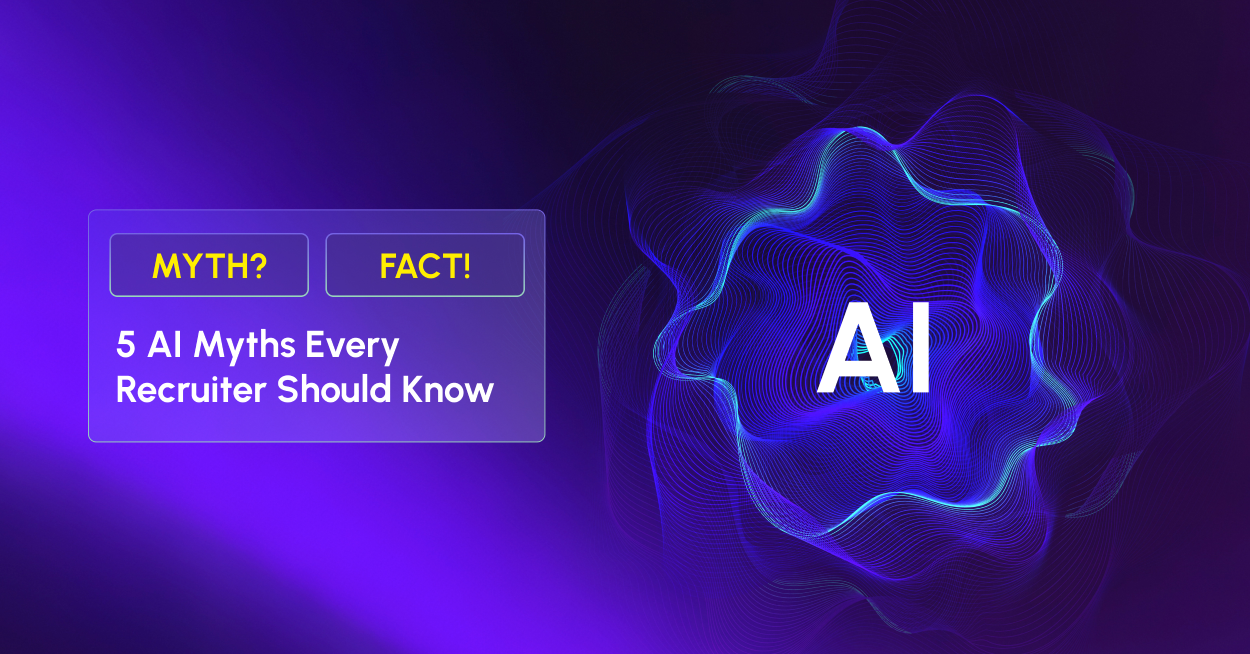
Artificial Intelligence in recruiting generates more myths than Marvel movies. After working with 1,000+ organizations implementing AI-powered talent engagement, we've heard every misconception imaginable.
Let's separate fact from fiction with the five most persistent AI recruiting myths—and what the data actually shows.
The Fear: Robots will take over recruiting, eliminating the need for human recruiters entirely.
The Reality: AI amplifies recruiters, it doesn't replace them.
Our customer data tells a different story. Organizations using Sense's AI-powered platform don't reduce recruiting headcount—they increase recruiter productivity by an average of 43%. Here's what actually happens:
Sarah Chen, Senior Recruiter at FinanceForward, puts it perfectly: "AI didn't replace me—it gave me superpowers. I can now build relationships with three times as many qualified candidates because I'm not drowning in busy work."
The Bottom Line: AI handles the repetitive tasks so recruiters can focus on what humans do best—building relationships and making strategic decisions.
The Fear: You need a computer science degree to use AI recruiting tools effectively.
The Reality: Modern AI recruiting platforms are designed for recruiters, not engineers.
This myth stems from early AI tools that required technical expertise to configure and maintain. Today's AI recruiting platforms are built with user experience as the top priority.
Here's an example from a recent customer and what they were able to set up within the first week:
Key Success Factors:
The Bottom Line: If you can use LinkedIn and your ATS, you can use modern AI recruiting tools.
The Fear: Candidates will feel like they're interacting with robots, creating an impersonal experience.
The Reality: AI enables more personalization, not less.
This is perhaps the most backwards myth of all. Manual recruiting processes are actually less personal because humans can't scale individual attention.
Traditional Recruiting Reality:
AI-Enhanced Recruiting Reality:
The Bottom Line: AI doesn't eliminate human touch—it scales it to reach every candidate consistently.
The Fear: AI recruiting is only suitable for technical roles or technology companies.
The Reality: AI delivers value across all industries and role types.
We analyzed implementation data across our customer base and found successful AI adoption in:
Healthcare: A healthcare customer reduced recruitment time from 52 days to 31 days using AI-powered candidate engagement Manufacturing: Industrial manufacturing customer filled production roles 47% faster using conversational AI Retail: Fashion Retailer reduced seasonal hiring costs by 28% with automated candidate nurturing
The key insight? AI's value comes from process automation and personalization, not technical sophistication. Whether you're hiring nurses, accountants, or warehouse workers, the fundamental challenges are the same:
The Bottom Line: AI recruiting success depends on process volume and complexity, not industry or role type.
The Fear: AI recruiting tools are only cost-effective for large enterprises with massive hiring volumes.
The Reality: AI delivers a strong ROI for mid-market companies.
This myth persists because early AI solutions required significant upfront investment and technical resources. Modern AI recruiting platforms operate on subscription models with immediate value.
Mid-Market Advantage:
Cost-Benefit Reality Check:
The Bottom Line: Mid-market companies often see faster, more dramatic results from AI recruiting than large enterprises.
Here's what we've learned from 1,000+ implementations:
Don't let myths prevent your organization from benefiting from AI recruiting. The companies implementing AI thoughtfully today are building competitive advantages that will compound over time.
The future of recruiting isn't about humans versus machines—it's about humans empowered by intelligent technology.